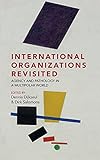International Organizations Revisited : Agency and Pathology in a Multipolar World / ed. by Dirk Salomons, Dennis Dijkzeul.
Material type: TextPublisher: New York ; Oxford : Berghahn Books, [2021]Copyright date: ©2021Description: 1 online resource (424 p.)Content type:
TextPublisher: New York ; Oxford : Berghahn Books, [2021]Copyright date: ©2021Description: 1 online resource (424 p.)Content type: - 9781800731226
- 9781800731233
- online - DeGruyter
| Item type | Current library | Call number | URL | Status | Notes | Barcode | |
|---|---|---|---|---|---|---|---|
 eBook
eBook
|
Biblioteca "Angelicum" Pont. Univ. S.Tommaso d'Aquino Nuvola online | online - DeGruyter (Browse shelf(Opens below)) | Online access | Not for loan (Accesso limitato) | Accesso per gli utenti autorizzati / Access for authorized users | (dgr)9781800731233 |
Frontmatter -- CONTENTS -- ILLUSTRATIONS -- PREFACE -- ABBREVIATIONS -- Introduction: International Organizations Revisited -- Part I Decision-Making with National Governments -- Chapter 1 Multilateral Diplomacy, Global Governance, and Networks of Intergovernmental and Nongovernmental Organizations -- Chapter 2 Financing as the UN’s Chronic Deficiency -- Chapter 3 Norm Setting at the United Nations: The Politics of Sustainable Human Development -- Part II Decision-Making within International Organizations -- Chapter 4 Managing People at the United Nations: Squaring the Circle of Merit and Patronage -- Chapter 5 Fraud, Corruption, and the United Nations’ Culture -- Part III Implementation and Evaluation -- Chapter 6 The Program Approach and Its Lack of Participation -- Chapter 7 How NGO Practices Mediate International Human Rights -- Chapter 8 Networked Diplomacy and Changing Polarity in World Politics: An Armenia-Turkey Normalization Attempt -- Chapter 9 The Use and Limits of Civil Society for Postconflict State Democratization: Donor Practices in Bosnia and Herzegovina Revisited -- Chapter 10 UN Security Council Resolution 1325 in Afghanistan: Opportunity or Rhetorical Device? -- Part IV Conclusions -- Chapter 11 Therapies and Conclusions: Toward a Better Understanding of the Management of International Organizations -- INDEX
restricted access online access with authorization star
http://purl.org/coar/access_right/c_16ec
Despite the sustained scholarly attention that the United Nations and international NGOs have received in the twenty-first century, they still remain under-researched from a management studies perspective. This volume brings together rich analyses of these organizations’ functioning, arguing that they are best understood as intermediaries between international decision-making and funding bodies in the developed world and initiatives that take place on the ground, primarily in the Global South. Based on current management research, this follow-up to Rethinking International Organizations (Berghahn, 2002) provides a wealth of both empirical and theoretical insights, along with practical recommendations how these organizations can function more effectively.
Mode of access: Internet via World Wide Web.
In English.
Description based on online resource; title from PDF title page (publisher's Web site, viewed 25. Jun 2024)


